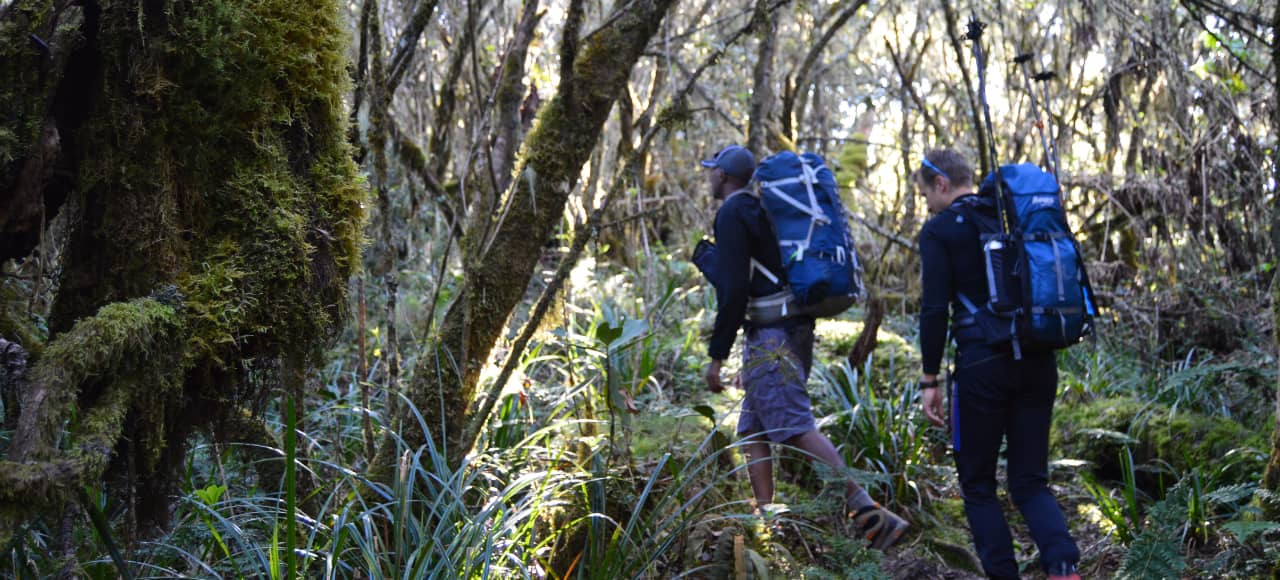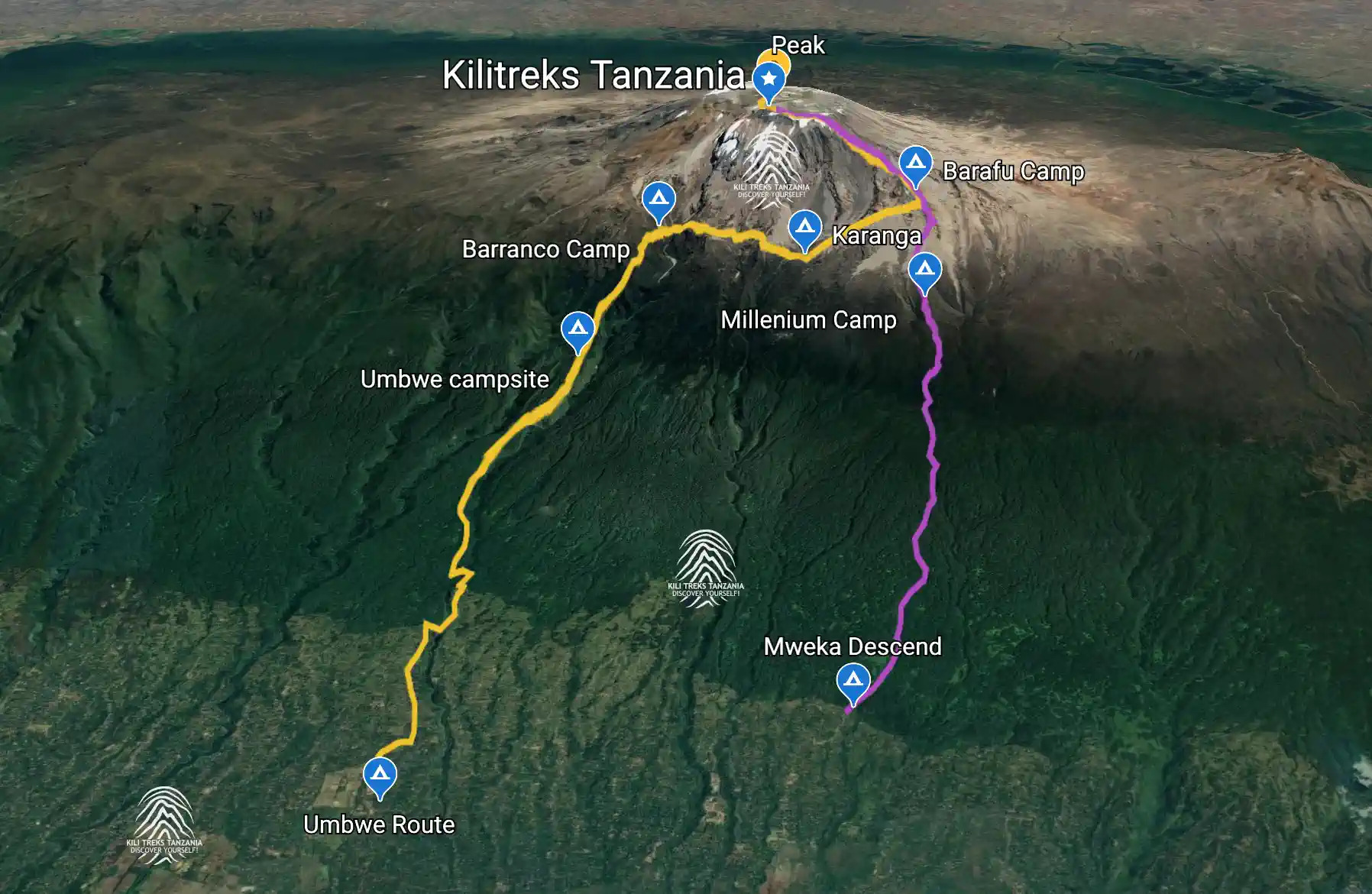
If you’re an experienced trekker looking for a challenging off-beat trek, the Kilimanjaro Umbwe route is the one for you! Widely known as the most difficult route to the peak, the Umbwe route features steep climbs at high altitudes in a fairly short amount of time. Acclimatisation is extremely brief, given the fast pace of this trek, and is recommended for seasoned trekkers only.
The Kilimanjaro Umbwe route lies to the south of the mountain and takes you through dense rainforests, cold alpine deserts, and steep ridges that pose a distinct challenge while offering sprawling views of the surrounding region.
Kilimanjaro International Airport
The most convenient airport to arrive to for the Kilimanjaro Umbwe route trek is the Kilimanjaro International Airport (JRO). Our driver and/or guide will be at the airport to greet you upon arrival and drive you to your lodge. Please refer to the itinerary for the accommodation arrangements.
Reach the Kilimanjaro International Airport and meet with a member of the Kili Treks Tanzania team who will transfer you to your lodge. Spend the day resting after your tiring travels and recharge for the upcoming trek.
Overnight: in Moshi
Meals included: Half board.
Once you’re driven to the start point of the trek, you’ll begin your climb with a packed lunch. You’ll trek through a lush rainforest and traverse steep and tricky trails on your way to your first camp, the Umbwe Cave Camp.
Overnight: Umbwe Cave Camp
Trekking time: 6-7 hours
Meals included: Full Board
Your terrain switches to rocky and slippery today as you leave behind the greenery and enter the moorland. Scramble around large boulders, marked by the bizarre lobelia and senecio plants, and volcanic rocks draped with lichen beards which protect wild alpine flowers growing at their bases. Although difficult, today’s stretch of the Umbwe route shows you some spectacular variety in terrain, flora, and fauna.
Overnight: Barranco Camp
Trekking time: 5-6 hours
Meals included: Full Board
Coming to one of the most challenging stretches of your Kilimanjaro Umbwe route trek, today you will scramble up the Barranco Wall, a steep volcanic outcrop formed due to the volcanic activity that took place on Mt. Kilimanjaro thousands of years ago. The scramble, that doesn’t particularly require rock climbing or mountaineering skills, soon leads you to the rolling ridges of Karanga Valley. You will also Kilimanjaro’s famous glaciers loom in the distance as you make your way to the Karanga camp.
Overnight: Karanga camp
Trekking time: 3-4 hours
Meals included: Full Board
As you gain altitude on your way to the Barafu Camp, temperatures start declining and the landscapes grow sparser and rockier. Today’s steep ascend leads you to the small, exposed flat area on a ridge, which will act as a base camp for the night. From here, you will make your summit attempt post-midnight.
Overnight: Barafu Camp
Trekking time: 3-4 hours
Meals included: Full Board
Just around midnight, you will begin your ascent to the Uhuru Peak. The climb is direct, and you gain altitude quickly. Be well prepared for frigid temperatures (-10°C to -20°C | 14°F – 4°F) and trekking tricky terrains in the dark. Celebrate your successful summit attempt at the Uhuru peak before you begin your descent to the High Camp.
Overnight: High camp
Trekking time: Barafu Camp to Uhuru peak 6-8 hours / 2 hours to High camp
Meals included: Full Board
After a hearty breakfast you will start to descend to the Mweka Gate. Together, the crew sing local songs describing the folk lore around their mystical mountains and spiritual homeland. Soon, you will bid them goodbye and be transferred to a day room where you can shower and relax before your evening flight home.
Overnight/day room: Kilimanjaro Wonders Hotel / AMEG Lodge
Trekking time: 5-6 hour

On the Umbwe Route Kilimanjaro trek, you’ll trek between 3 – 7 hours most days. The summit day is a bit longer day, with trekking hours going up to 8-12 hours.
The best way to reach Kilimanjaro is to fly to Kilimanjaro International Airport (JRO). The airport is frequented by many international airlines from across the world. From the airport, we will transfer you to your hotel (which, as with the transfer back to the airport at the end of your trek, is included in the price of your trek).
You will need to start preparing for your Kilimanjaro climb at least 3 to 4 months in advance. We recommend exercises that help build your stamina, control your breathing, increase your endurance, and get you accustomed to climbing on inclines. You can choose to include hiking up and down hills with weight to make your body accustomed to different terrains and hiking with a full backpack. Try to build up from 3 hour to 8 hours hikes once a week. Taking regular and increasingly longer hikes will help develop the muscles that you need when the day comes for climbing Kilimanjaro. You can also train with cardio exercises, yoga, and frequent runs.
Write to us at info@kilitrekstanzania.com or visit our preparation page for more training recommendations.
The best months to go are from December to February and June to October. Though the trek remains operational for the rest of the year, there is a high probability of rain, adding to the difficulty of your trek.
Though the Umbwe route is among the more challenging routes to Kilimanjaro, it is still easily doable by trekking beginners. You should be fully aware of the conditions, seasonal climates, and requirements to prepare yourself for this challenge. As long as you prepare well before your trek and follow the proper pacing and acclimatization instructions of the guide while on the trek, beginners should be good to go!
No specialty mountaineering gear is needed (i.e., ice axe, crampons, helmet, etc.) to climb Kilimanjaro. However, basic trekking gear like hiking boots, base layers, fleece hats and gloves, a fleece sweater, etc are required. Once you’ve joined a Kilimanjaro Umbwe Route trek, you’ll receive a detailed packing list and rental gear list to help you prepare.
Our highly trained chefs prepare three hot nutritious meals daily, as well as trail snacks and afternoon tea each day. Enjoy your meals in our dining tents with fellow trekkers and guides. We are also equipped to accommodate vegetarian, vegan, gluten-free and other specialty meals with advance request.
We provide clean drinking water each night for you to fill up your water bottles for the trek. A trained porter will purify and filter water for you. We recommend you bring two to three 1-ltr bottles.
During the Kilimanjaro Umbwe Route trek, you’ll stay in double occupancy all-weather tents with full-ground sheets to keep you and your gear dry. These tents will be set up each day by our expert crew. Toilet tents, dining tents with tables and chairs, and basins of hot water for washing are provided at every campsite.
It is important to consult your doctor before departing for the trek for the types of medications you need to carry with you. Make sure you carry any prescription medicines you need. Though all our guides carry a first aid kit, make sure you carry one yourself in case you need immediate help. Carry enough medication to last you the duration of the trek and a few extra in case your trip gets extended.
Cellular network is extremely inconsistent on the Umbwe route. You can check with your guide or porters to know when the occasional signal pops up, but that, too, is infrequent.